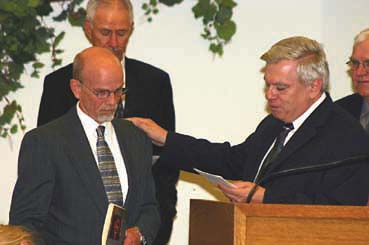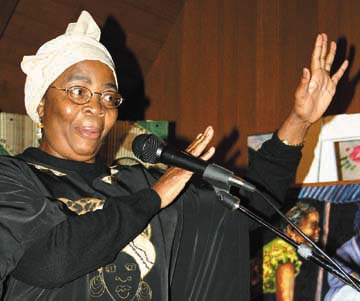Canadian Mennonite
Volume 8, Number 21
November 1, 2004

Peace conviction leads pastor to Mennonite pastorate
Osler, Sask.
 |
| Ken Bechtel (right), Conference Minister for Mennonite Church Saskatchewan, leads the installation service for Gordon Allaby at Osler Mennonite Church on September 19. |
Gordon Allaby’s decision to leave the Baptist church was a long and thought-filled process, but he’s happy to be a part of the Mennonite church now. Allaby is the new pastor of the Osler Mennonite Church.
“Since my teenage years, I had a passion for peace,” he said. Now 51 years old, he has a varied history from which to draw for his faith.
The son of a Baptist pastor, Allaby was born in the United States when his father was attending seminary there. He spent his formative years in Toronto. During his teen years, the family moved to Ohio where his father took another pastorate. Allaby has dual citizenship.
Although he lived most of his adult life in the U.S., he feels equally at home north of the border because of family connections here. His mother has some Mennonite heritage in Saskatchewan, he said.
The resolve to move away from the Baptist culture was triggered in part by the pressures of the Vietnam War. Allaby had registered his desire to be a conscientious objector but without a peace church to sponsor him, he had a difficult time convincing authorities that his request was legitimate. At the same time, the Baptist church in the U.S. was becoming more militant in its support of the war.
“It became more and more uncomfortable to be Baptist,” said Allaby. Through the influence of his former youth pastors, and some Mennonite friends, he made the move to a more peace-embracing faith.
The move to ministry came later. He was managing a nursery when he felt a tug on his heart to minister. At the age of 34, Allaby found himself finishing his undergraduate degree. Further schooling followed at a Southern Baptist seminary in Kentucky. In 1991 he completed his Master of Divinity degree.
His first experience as a Mennonite pastor came through a church planting situation in Ohio. That was followed by a stint at First Mennonite Church in Moundridge, Kansas.
As a pastor, Allaby has tried to promote peace. He helped organize a peace rally on Christmas Day in Kansas in response to the American invasion of Iraq, and has written articles challenging Christians to do more.
A willingness to consider a position in Canada was spurred by the political climate back home. “The trend in the States is too uncomfortable,” he explained.
Allaby said “yes” to a pastorate in rural Saskatchewan and moved here with his wife, Leslie, who has a background in palliative care, and their five-year-old daughter, Catherine. He’s enjoying the close-knit community he’s found.
“I’ve come to appreciate prairie people; there’s a warmth and a resolve there,” he noted. Osler Mennonite Church has an interest in peace and justice which fits well with his own spiritual convictions.
He sees a lot of potential in the church that called him. There is a lot of energy there, he said.—Karin Fehderau
African leader joyfully shares gifts
 |
| Nkala |
Kitchener, Ont.
A home which is not visited is not a home at all.” Barbara Nkala uses this African saying to describe how hosting the Mennonite World Conference 2003 assembly affected the Brethren in Christ Church of Zimbabwe.
She adds, “God must have a sense of humour,” for in spite of great food shortages and a power outage, the visitors were able to enjoy a “royal feast.”
Nkala, a Brethren in Christ leader in Zimbabwe, recently visited Canada and spoke at several events (see Oct. 18 issue). In an interview, she talked about the assembly and the church in her country.
Before the assembly, the Brethren in Christ (BIC) in that region hardly knew other Anabaptists. Mennonites appeared as “big brother/sister.”
The assembly had an impact on this year’s annual BIC meetings held in August—there was standing room only! The messages had a new fire. Many people were carrying the tote bags provided at assembly and they introduced the assembly model of having workshops.
Nkala’s personal story is inextricably woven into the story of Zimbabwe and its people.
“Even Africa has something to offer,” she says. “We can offer love, and we can offer from the little we have, even as the story of the widow’s mite tells us, how she gave out of the abundance of her heart. To give in prayer too is a precious offering.”
BIC churches now choose areas of the worldwide church to pray for. They see that persons in other places, such as Latin America, are also suffering. “We are not alone in suffering” and “God is able” are two phrases she repeats often.
Zimbabwe, like other parts of Africa, has suffered famine as well as the plague of AIDS. The burden is on women who are the caregivers. All too often grandparents, who themselves need care, are taking care of their orphaned grandchildren.
But even as she talks about these difficult times, Nkala remembers how her grandfather would sing, “Count your blessings, name them one by one….” Nkala projects the same spirit as she speaks about how God is the “great provider.”
A teacher and writer, Nkala has worked for a publishing company for 10 years. When she could not get a licence from South African press to print hymnals in Zimbabwe, she felt God saying to her, “Why not start your own publishing company?” She hopes to publish hymnals and Bible study materials in a local dialect.
Nkala especially appreciated the MWC assembly workshop on grief and healing. One of her publishing goals is to collect women’s stories of loss; she thinks telling the stories will bring hope to readers.
She has great energy and enthusiasm, and an entrepreneurial spirit, but she is greatly hampered by lack of capital for this publishing endeavour. In this, too, she believes God will provide.
Nkala is hesitant to comment on the Mennonite church in Canada. She did observe that more affluent people have fewer worries, but don’t trust God as much.
“When you are comfortable, you take things for granted,” she says. “You forget that it is the supreme God who is in control and who provides everything.”
It seemed strange to sit in a church service where people did not follow the scripture reading in their Bibles. “Back home, people are hungry for the word of God. Each person wants to own a Bible…sometimes only the pastor has a Bible.” She adds that young people will challenge what they hear to learn better.
Women have traditionally not been pastors in Zimbabwe. Nkala notes wryly that two pioneer women used to go to remote, lion-inhabited areas to establish churches. Today, it is the women who lead Bible study and prayer in many villages, but when the group grows to a certain size, the denomination sends a male pastor to lead them.
Nkala, who is an elder in the BIC, at first hesitated to lead worship at the MWC assembly, but she proved to be a dynamic leader. She is a little sad that she was complimented only by people ourside of her culture. She believes that many of her sisters are gifted leaders. “I believe with years things will change,” she concludes.
Nkala is pursuing a masters degree in Leadership and Management at an academy in Harare, the capital of Zimbabwe. She is also director of the International Bible Society of Zimbabwe and Malawi, and contributor to the Africa volume of MWC’s Global Mennonite History project.
Above all, she is a sister in Christ and a good emissary between the church in Africa and people in the north. As she joyfully shares her gifts with the church, she is “laughing with God” at what is possible.—Maurice Martin
Copyright for the contents of this page belongs to Canadian Mennonite. Please seek permission to reprint from the editor.



